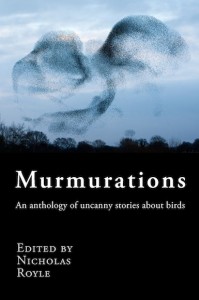 Buy it from Two Ravens Press, from Amazon, or for your Kindle.
Buy it from Two Ravens Press, from Amazon, or for your Kindle.
I love birds, and I love odd things, so I was thrilled when Nicholas Royle asked me to contribute to this new anthology of uncanny short stories about birds. It has a mix of newly commissioned and classic stories – the MOST classic of which is Daphne du Maurier’s The Birds, the story that inspired the Hitchcock film.
The starting point for my story, Swallows sleep in winter, was a quote from Samuel Johnson, from a time before anyone realised that swallows migrate to Africa at the end of the summer. He wrote: “Swallows certainly sleep all winter. A number of them conglobulate together, by flying round and round, and then all in a heap throw themselves under water, and lye in the bed of a river.” Brilliant. It’s a shame we discovered the truth.
Here’s the full line up:
Swallows Sleep in Winter – Adam Marek
For the True Anatomy – Claire Massey
Sliding off the World – Bruce Gilbert
The Gannets – Anna Kavan
Fight or Flight – Emma Jane Unsworth
Birds of Prey – Joel Lane
The Egg – Alison Moore
The Raven – Russell Hoban
The Rhododendron Canopy – Elizabeth Stott
Huginn and Muninn – Tom Fletcher
When the Red, Red Robin – Regi Claire
A Nestling – Jack Trevor Story
Barren Clough – Neil Campbell
Shrike – David Rose
The Candling – Deborah Kermode
A Revelation of Cormorants – Mark Valentine
The Brids – Bill Broady
Rarely Visits Gardens – Juliet West
All Our Dead Heavens – Conrad Williams
Tsipporah – Adèle Geras
Dead Bird – Socrates Adams-Florou
The Beautiful Room – RB Russell
Gulls – Nicholas Royle
Snow – Marc Werner
Flight of Fancy – GA Pickin
The Wounded Bird – Michael Kelly
Corbeaux Bay – Geeta Roopnarine
Husks – Stephen Bacon
Painful Hard Ectoplasm – Laura Ellen Joyce
The Birds – Daphne du Maurier
‘These tales exude a striking weirdness and a sense of wonderment … Exploring “the way in which birds inhabit the border between the mundane and the extraordinary”, these stories provide a startling glimpse into a world of otherness capable, at times, of eerily mirroring our own.’
The Guardian